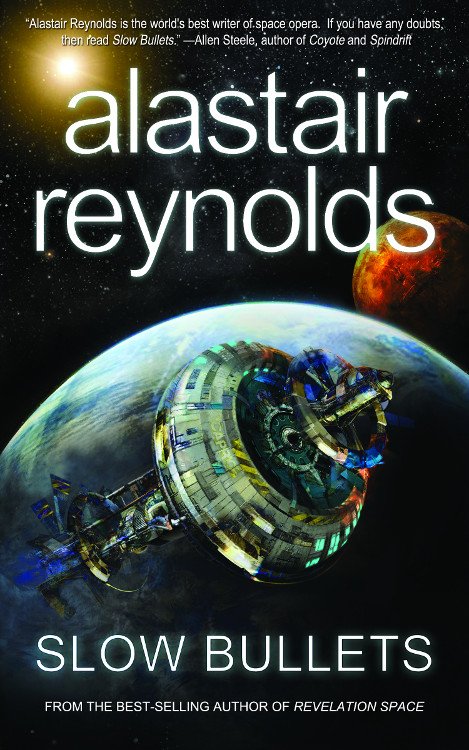Being a review of the very book pictured below, finalist for the novella category of the 2016 Hugo Awards.
Technological implants aren’t science fiction any longer; they’ve been a reality since before the turn of the century. The concept itself still lingers in sf’s idea space, though. The very thought of a subdermal foreign object evokes the retrofuturism of cyberpunk, or some other no-hope near-future. Which is why Alastair Reynolds can build an entire novella around the image of an identification implant shaped as a bullet, and not risk bringing to mind the RFID chips we tag our pets with, or something equally quotidian.
Even though this space opera branches out far and wide from the grubby war-is-hell opening scene introducing the so-called slow bullets, the story’s pivotal moments are still tied to this concept. Reynolds handles the motif gracefully, keeping our attentions trained on the grander, more urgent plot developments (of which there are plenty), but still making sure that his projectiles are worming their way under our skin.
Along the way, there are moments of both queasy-making cosmic horror and genuinely touching humanist uplift, but Reynolds is careful not to let either distract from the pragmatic, no-nonsense tone of his stranded cast. Their plight is about as existential as you can get while still retaining believability, but like in any other crisis, the here and now is more than enough for these people, even if their lives are crashing down around them.
Aside from the aforementioned outlier moments, I was ready to chalk Slow Bullets up as a solid, well-crafted B+ piece of entertainment. The more I think about it, though, the more ingenious its construction seems to me, its science fictional ideas not just window dressing, but powerful motifs to reflect the themes of the story.
In the last few years, controversy has arisen around the supposed loss of the aspirational in sf literature. To me, Reynolds provides a stirring response here: more often than not, there’s nothing noble in progress, nothing heroic or pretty in the kind of situations that best highlight the perseverance and indomitability of the human spirit. But even when we’re at our lowest and most petty, there’s still something life-affirming and beautiful about how we refuse to give up.
Some housekeeping related to my journey through the Hugo finalist field:
Still waiting for that paper copy of Uprooted, so I can finish it. Because of reasons related to how the nomination process was manipulated for the Short Story category, I might skip that specific read-through, which should free up some time. Maybe I’ll reread and write up the story I’ve decided to vote for (really enjoyable, by the way!) as the deadline approaches. Anyroad, I think I’ll just get stuck into one of the other novels next, as they’ll take the longest to finish.
